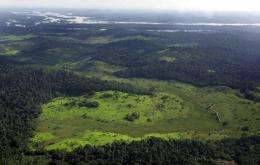Vale plays down fears Amazon rail project will harm tribe

Mining giant Vale on Friday played down fears that its planned expansion of a railway line in the Brazilian Amazon will harm the already vulnerable Awa tribe.
Survival International, a leading advocate for the rights of tribal people worldwide, on Thursday said that Vale's plans to extend its Carajas railway line are "putting Earth's most threatened tribe in direct danger" and are opposed by the Awa.
"The Awa are against the project. They say it will increase the amount of noise from the railway, scare away the game they need to survive, and increase the number of invaders in their forest," it added.
But Vale told AFP that the project was still in the planning stage and that the company was holding talks with the area's indigenous communities as required by Brazil's National Indian Foundation (FUNAI) to secure authorization from environmental regulators.
It said the two sides planned to hold a workshop to assess "the positive and negative impacts" of the expansion project.
"If the Awa are opposed, nothing will happen," said a Vale official, speaking on condition of anonymity.
The Brazilian mining behemoth owns the Carajas iron ore mine, the world's largest with 7.2 billion metric tons in proven and provable reserves, located in a remote corner of the Amazon rainforest in the northern Para state.
It carries the iron ore from the mine to the Atlantic port of Sao Luis in two-kilometer (1.2 mile) long trains.
"Now it (Vale) wants to expand this stretch of railway line to allow some of the longest trains in the world to run simultaneously in both directions, to increase capacity," Survival International said.
The rights group said the Carajas mine and railways "devastated the Awa tribe in the early 1980's by opening their land up to settlers, ranchers and loggers."
A Brazilian government survey cited by Survival International estimates there could be "up to 4,500 invaders, ranchers, loggers and settlers" occupying just one of the four territories inhabited by the Awa, whose total population stands at no more than 450.
In April, Survival International launched a major campaign spearheaded by Britain's Oscar-winning actor Colin Firth to focus attention on the plight of the Awa, saying they were threatened with "genocide" and "extinction."
According to Survival, there are roughly 360 Awa who have been contacted by outsiders, many of them survivors of massacres, along with another 100 believed to be hiding in the rapidly-shrinking forest.
FUNAI estimates that there are 77 isolated indigenous tribes scattered across the Amazon rainforest. Only 30 such groups have been located.
Indigenous peoples represent less than one percent of Brazil's 191 million people and occupy 12 percent of the national territory, mainly in the Amazon region.
(c) 2012 AFP




















